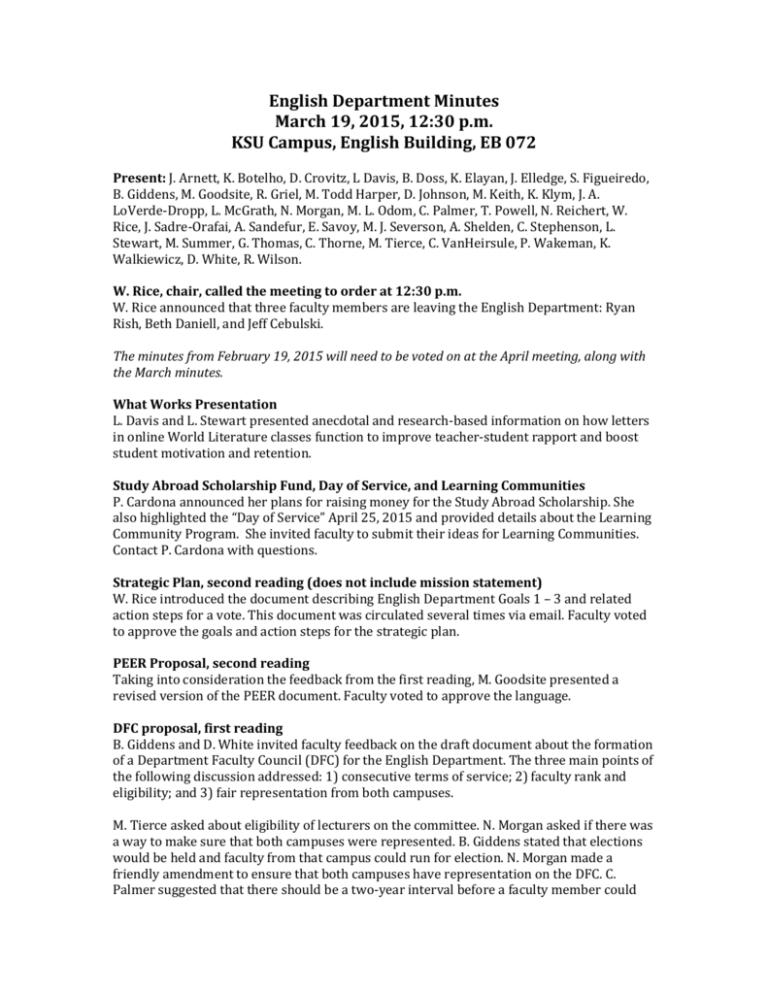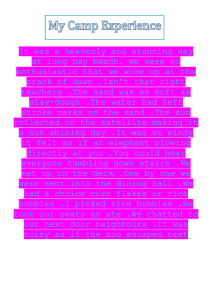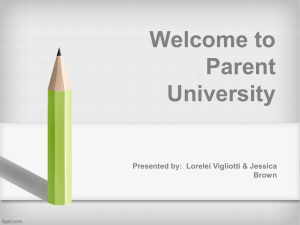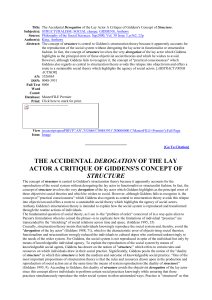February 2015 - January 2014
advertisement

English Department Minutes March 19, 2015, 12:30 p.m. KSU Campus, English Building, EB 072 Present: J. Arnett, K. Botelho, D. Crovitz, L Davis, B. Doss, K. Elayan, J. Elledge, S. Figueiredo, B. Giddens, M. Goodsite, R. Griel, M. Todd Harper, D. Johnson, M. Keith, K. Klym, J. A. LoVerde-Dropp, L. McGrath, N. Morgan, M. L. Odom, C. Palmer, T. Powell, N. Reichert, W. Rice, J. Sadre-Orafai, A. Sandefur, E. Savoy, M. J. Severson, A. Shelden, C. Stephenson, L. Stewart, M. Summer, G. Thomas, C. Thorne, M. Tierce, C. VanHeirsule, P. Wakeman, K. Walkiewicz, D. White, R. Wilson. W. Rice, chair, called the meeting to order at 12:30 p.m. W. Rice announced that three faculty members are leaving the English Department: Ryan Rish, Beth Daniell, and Jeff Cebulski. The minutes from February 19, 2015 will need to be voted on at the April meeting, along with the March minutes. What Works Presentation L. Davis and L. Stewart presented anecdotal and research-based information on how letters in online World Literature classes function to improve teacher-student rapport and boost student motivation and retention. Study Abroad Scholarship Fund, Day of Service, and Learning Communities P. Cardona announced her plans for raising money for the Study Abroad Scholarship. She also highlighted the “Day of Service” April 25, 2015 and provided details about the Learning Community Program. She invited faculty to submit their ideas for Learning Communities. Contact P. Cardona with questions. Strategic Plan, second reading (does not include mission statement) W. Rice introduced the document describing English Department Goals 1 – 3 and related action steps for a vote. This document was circulated several times via email. Faculty voted to approve the goals and action steps for the strategic plan. PEER Proposal, second reading Taking into consideration the feedback from the first reading, M. Goodsite presented a revised version of the PEER document. Faculty voted to approve the language. DFC proposal, first reading B. Giddens and D. White invited faculty feedback on the draft document about the formation of a Department Faculty Council (DFC) for the English Department. The three main points of the following discussion addressed: 1) consecutive terms of service; 2) faculty rank and eligibility; and 3) fair representation from both campuses. M. Tierce asked about eligibility of lecturers on the committee. N. Morgan asked if there was a way to make sure that both campuses were represented. B. Giddens stated that elections would be held and faculty from that campus could run for election. N. Morgan made a friendly amendment to ensure that both campuses have representation on the DFC. C. Palmer suggested that there should be a two-year interval before a faculty member could serve on the committee again. N. Morgan suggested that faculty members should be limited to one term of service. B. Giddens stated other departments allow repeated terms of service on DFCs. N. Morgan suggested broadening the eligibility for the DFC since our department is so large. Discussion ensued about the number of tenured faculty without administrative appointments. It was estimated at 20 or less. J. Arnett suggested a “sunset clause” for the Marietta campus. Discussion continued about whether tenure-track faculty should participate on the committee. M. Tierce explained that every year three members of the DFC must assess the chair. Several faculty members stated that because of the sensitivity of issues that come to a DFC, tenured faculty would be best suited to serve on the committee. B. Giddens asked for clear direction for revision. She asked whether faculty favored eliminating consecutive terms. There was no response. Thus, she stated that the current language will stand. W. Rice, speaking as a member of the department, agreed with N. Morgan that we need a designated representative from the Marietta campus. B. Giddens stated she will take all the feedback into account, revise the draft, and circulate the revised proposal. After the meeting, R. Wilson, B. Giddens, and A. Shelden discussed the procedure for proposing a DFC via the department listserv. Class Size Committee Report J. Arnett thanked all of the members of the committee. He presented a document with recommendations for class sizes. He stated multiple professional organizations agree there should be no more than 60 writing students per instructor in a semester and no more than 20 students in a writing class. Benefits would include increased student engagement and improved classroom teaching and learning. He briefly highlighted several recommendations by the committee. He invited faculty to contact him with questions about this detailed report. From the report, class-size recommendations are as follows: Writing and Rhetoric: • General Education writing courses should be capped at 19 students. • Lower-level undergraduate creative writing courses should be capped at 20 students. • Upper-level creative writing courses should be capped at 15 students. • Lower-level courses in rhetoric and professional writing should be capped at 20 students. • Upper-level classes in rhetoric and professional writing should be capped at 15 students. • Writing-intensive literature and linguistics courses should be capped at 20 students Literature, Linguistics, and Film Courses: • General Education literature courses (other than Honors sections) should be capped at 25 students. • Large-enrollment sections of General Education literature courses should be capped at 39 students. • The gateway courses—Introduction to English Studies and Senior Seminar— should be capped at 15 students. • Sophomore literature survey courses should be capped at 24 students in order to function well. • Upper-level literature, linguistics, and literary theory courses should be capped at 21 students in order to offer suitably advanced material. • Film courses should be capped at 27 students. Discussion ensued about the information J. Arnett presented. He stated these are “aspirational goals.” K. Botelho noted these recommendations suggest the need for additional hires. M. Tierce stated there are classroom space assignment implications. W. Rice stated that this information is valuable for making the case for manageable class sizes to improve teaching, learning and retention. He thanked the committee for this detailed report. English/Community Engagement Position Search S. Figueiredo stated the search committee has identified three candidates and they are working on bringing them to campus. Composition Director Position W. Rice stated that changing the description of the position from a General Education Director to a Composition Director leaves a gap in leadership for the sophomore literature courses. He stated that the Advisory Council suggested moving the coordinator position from a 10-month position to a 12-month Director position to address this gap. Also, there is a need for representation on both campuses for composition and literature general education courses. A discussion is ongoing about funding for this general education position, which, it is argued, should come from the university rather than the college. W. Rice will apprise the faculty of any information he receives. W. Rice adjourned the meeting at 2:00 p.m. Respectfully submitted, Linda S. Stewart Upcoming events: April Department Meeting: Thursday, April 16, 2015 12:30 p.m. Room EB 72, Kennesaw Campus. Advisory Council on the Kennesaw Campus: Tuesday, March 24h @ 12:30 in EB 250. All are welcome to attend. Cultural Studies and Literature on the Marietta campus: Tuesday, April 21, 12 – 12:50 p.m. Room: J133 a. Nancy Reichert: A Dash of This and A Dash of that: Teaching the Cultural Stew in Literature Classes—Some Very Brief Comments b. Kat Gray: A League of Extraordinary Victorians: How Literature Informed My Perspective on Steampunk c. Erin Sledd: "From Deus ex Machina to Machina Deus Est: Disruptive Deities and Disruptive Technology in Literature"








